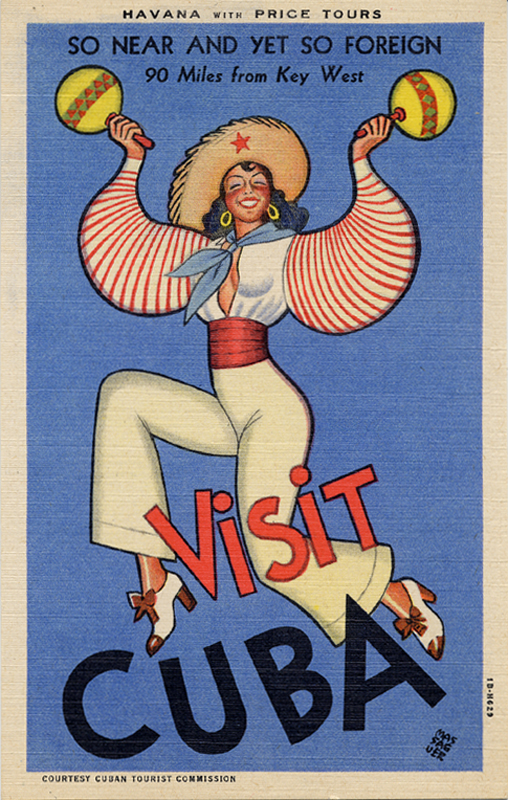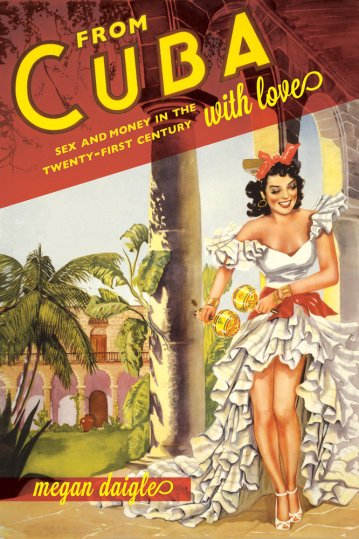The last commentary post in our forum on Megan’s From Cuba With Love, following contributions from Megan herself, Rahul, Dunja Fehimovic and Nivi. Megan’s rejoinder will be up imminently.

So near and yet so foreign! declares the advert. Intimate and exotic, Cuba as a repository for fantasy and self-discovery, the neighbour with the mixed-race charms, the imagined nation Cindy Weber once analysed so relentlessly as “the near colony and certain feminine complement” of the United States. Megan’s new, and first, book – From Cuba With Love – exposes the same kind of dynamic, although from a different standpoint.[1] Hers is a near-seamless blend of reportage and feminist IR, moving from autobiography to testimony to political theory, translating from events on the Malecón (the long waterside promenade in Havana dubbed “Cuba’s great sofa”) to the masculine histories of the Cuban state and back again. It is also – for those seduced by such things – a book beautiful to look at, and to hold (which is a way of saying that you should buy a hard copy). It is a book about evasion, repression and muddled motives, but is itself a model of generosity and clarity.
The central figure throughout is the ‘jinetera’, superficially close to the idea of a ‘prostitute’ but evidently much more ambiguous in definition and shifting in practice. As Megan explains, the term ‘jinetera’ and the general practice ‘jineterismo’ are plays on ‘jockeying’, meaning to manoeuvre for advantage and also to have sex, both connotations clearly playful, if also risky (see the previous posts in the forum for more discussion on the meaning and forms of jineterismo).[2] It is with a curiosity about jineterismo that Megan starts. But where we end up is inside an indispensable guide to the ‘sexual-affective economy’, a bold innovation in disciplinary writing, and a testament to the difference gender analysis makes in studying the global political.
From Cuba With Love does what a certain kind of post-structural feminist IR does best, dissecting the identities created by, and in, a concrete historical system. Not the narrow ‘identity politics’ critics abhor, but identity as the fullness of lived experience shot through with power, subjectivities which are at once deeply personal (love, hope, desire, sex) and interwoven with the most brute forms of political violence (the state, the prison camp, the rehabilitation centre, the police system, imperialism and resistance, exclusion and poverty). It is a study that is undeniably ‘global’ in its scope, even about inter-national relations in a rather precise sense, given how often the admixture of sex and money circles the desires of the (usually) western male for a ‘local’ rendezvous, and how implicated notions of race, nation, difference, rivalry, trade, progress, savagery, miscegenation, and geopolitical virility are in that. A kind of diplomacy, even. This is an encounter with ‘the Other’, and a negotiation of the foreign, in its most visceral possible form. Or, as one key informant more bluntly puts it:
It’s different if one goes to bed with a foreigner, or a mountain of foreigners…Do we have to carry such chauvinistic patriotism with us in our pussies too? Is it obligatory to make use of a mambí dick? Or are they trying to avoid alienating penetrations?
Yet From Cuba With Love is not just a great success on those terms. It is also in many ways the stand-out example of ‘narrative IR’, that vague but increasingly popular sub-field (or is it a method?) devoted to exploring world politics from the situated perspective of someone experiencing it (that someone usually being the researcher themselves). Continue reading →



